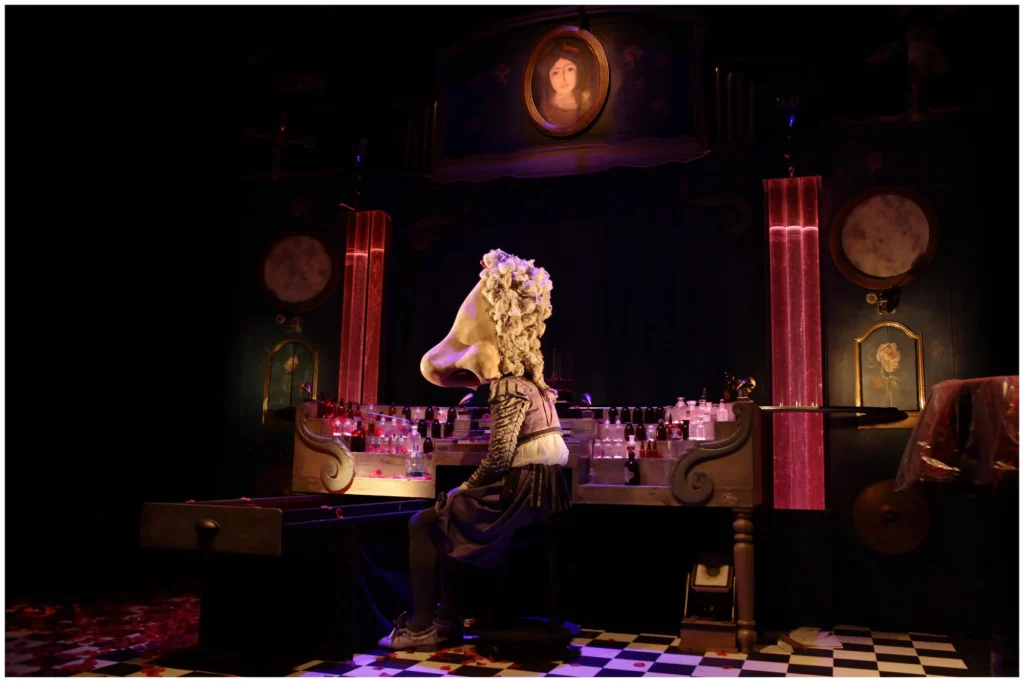
French company Les Antliaclastes return to the Barbican Theatre next week as part of MimeLondon 2024, marking their first appearance there since 2019, when they presented Waltz of the Hommelettes – a show loosely weaving together a trio of short stories from the Brothers Grimm. It was hailed by The Guardian as “darkly comic and absurdly charming.”
Under the direction of the company’s artistic director, Vermont-born Patrick Sims, their new production Ambergris sees them once again weaving together three stories, that of Pinocchio, Captain Ahab from Moby Dick and the biblical character Jonah.
Speaking with me on a video call from France, Sims tells me, “It’s a blending of these three stories through the workings of a perfumer. A perfumer is called a nose, so already there’s an association with Pinocchio.”
That image of Pinocchio was long in Sims’ mind as a potential starting point for a piece of theatre. “When I was young, maybe I saw a cartoon of Pinocchio and Ahab inside the belly of a whale together. And I was like; yeah, why not? That’s an image that stuck with me since – a very, very long time.”
He notes the commonality, not just with these three characters but with characters throughout the literary world. “There are many stories throughout the world of a man being trapped inside a fish and being swallowed by a fish.” While researching these stories, Sims discovered the strange substance Ambergris.
“[It’s] a waxy, oily product produced by sperm whales when they have indigestion. They’re usually secreted to dislodge squid beaks or stuck cuttlefish, or these days it could be manmade debris as well. These hard objects can’t pass through the whale’s digestive system so it produces this secretion called Ambergris. It’s a highly sought-after substance by perfumers, but also homoeopaths throughout the world.”

Ambergris became a driver for the play and a driver for the perfumer within it – and it’s an apt metaphor. “Ambergris is produced in the belly of sperm whales that can’t digest materials. The object inside this particular sperm whale is Pinocchio who refuses to become a real boy, he doesn’t want to become a real boy and therefore the whale becomes constipated and creates ambergris.”
That allowed Sims to tie the story of the perfumer to the stories of these three characters, he says, “It’s the philosopher’s stone for this perfumer. He’s looking for ambergris, and it’s ambergris in itself that ties these three stories together as a perfuming element as well. [It] works as a binder [in perfumery] – it binds disparate themes or stories together, but also makes each one better. So I use this as a metaphor… for blending these stories.”
It’s a piece therefore with an incredible literary debt, with Sims also finding influence from the novel Perfume by Patrick Suskind. It’s a method of development that is notable for its basis within puppetry.
“It’s very much in the tradition of traditional Puppet Theatre,” he notes, “You’re working with characters and stories that everyone already knows, in order to say something a little bit different about them. So everyone’s coming, more or less to [the play] with the stories in mind, while we’re re-mixing them.”
That puppet tradition flows through the play and is one of the reasons Sims has enjoyed the development. “It was a great thing to work on with this company because we love to build the masks, puppets, mechanics [and] automata.”
And there has been a huge amount of development in creating the elements of the piece. “The whole show takes place inside the giant perfume organ… based on a vaudevillian steam organ like the one you would find in the story of Pinocchio, for example, but this steam organ actually transforms into a perfume.”
The story has also allowed the company to stretch within the tradition. “It’s a real mixture of different styles and techniques of puppets but also mask play, visual effects, stage illusions and quite [a] mechanical fanfare atmosphere… a dark circus atmosphere behind it.”

That, he says, provides them with a unique space to incorporate traditional and contemporary puppetry techniques. “I incorporate a lot of old traditional magic techniques into our shows, we often use more high tech, new technologies and performance as well but often go back to the old school ways because they’re often simpler and more efficient… in the end, we mix the new and the old.”
I ask him about the violently contrasting imagery that Les Antliaclastes are known for. “The violent contrast for me comes with a lot of elements of surprise. There are a lot of surprises, there’s a lot of changing in dimensions [and] scale, which can sometimes be quite quite quite shocking to go from one scale to another very, very quickly.”
That is also where another key component of the show comes into play: music. “As the show is more or less wordless, sometimes new scenes and interactions can arrive quite abruptly, but everything is following the musicality of the soundtrack. It’s very, very musical.”
Sims is looking forward to returning to the Barbican, he tells me, “I love playing in London [and] last time we had a good time in the Barbican. We have a lot of friends and family in London, so it’s always nice to visit.” He’s happy too that the show sold out weeks in advance, even if that does cause a bit of a challenge; he’s struggling to find tickets for friends. A nice problem to have, I suggest.
He has praises for MimeLondon too: “The festival is great – Joseph [Seelig] and Helen [Lannaghan] done a miracle job of keeping it going.”
As for how the shows go, Sims reflects on his experience in taking a perfumery course as part of his research while working on the show and the similarities he found between developing perfume and developing theatre.
“You can’t you can’t choose how your perfume is going to come out,” he says. “You can help it turn in a certain direction but in the end, it’s gonna do what it wants to do. Like a child, like Pinocchio, like a perfume – it’s gonna have its own life.”
Read our full MimeLondon coverage here:















